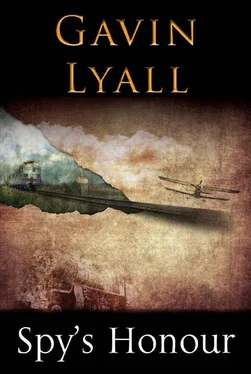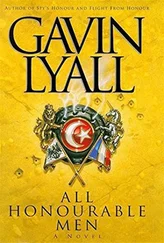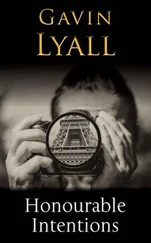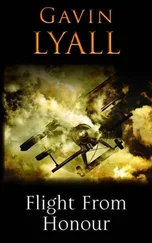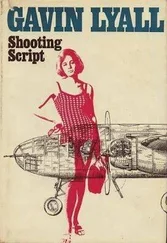Gavin Lyall - Spy’s Honour
Здесь есть возможность читать онлайн «Gavin Lyall - Spy’s Honour» весь текст электронной книги совершенно бесплатно (целиком полную версию без сокращений). В некоторых случаях можно слушать аудио, скачать через торрент в формате fb2 и присутствует краткое содержание. Год выпуска: 2013, ISBN: 2013, Издательство: PFD Books, Жанр: Шпионский детектив, Исторический детектив, на английском языке. Описание произведения, (предисловие) а так же отзывы посетителей доступны на портале библиотеки ЛибКат.
- Название:Spy’s Honour
- Автор:
- Издательство:PFD Books
- Жанр:
- Год:2013
- ISBN:0340609729
- Рейтинг книги:5 / 5. Голосов: 1
-
Избранное:Добавить в избранное
- Отзывы:
-
Ваша оценка:
- 100
- 1
- 2
- 3
- 4
- 5
Spy’s Honour: краткое содержание, описание и аннотация
Предлагаем к чтению аннотацию, описание, краткое содержание или предисловие (зависит от того, что написал сам автор книги «Spy’s Honour»). Если вы не нашли необходимую информацию о книге — напишите в комментариях, мы постараемся отыскать её.
Spy’s Honour — читать онлайн бесплатно полную книгу (весь текст) целиком
Ниже представлен текст книги, разбитый по страницам. Система сохранения места последней прочитанной страницы, позволяет с удобством читать онлайн бесплатно книгу «Spy’s Honour», без необходимости каждый раз заново искать на чём Вы остановились. Поставьте закладку, и сможете в любой момент перейти на страницу, на которой закончили чтение.
Интервал:
Закладка:
“No. Please.” The man stuffed a cigarette in under his moustache and waved a match after it. Ranklin held his breath: the moustache looked very vulnerable. But the cigarette caught first, and the man held out a fat firm hand.
“Gunther Arnold,” he announced. “I am going to France.”
Unless I’m on the wrong boat, so are we all, Ranklin thought. “Captain Ranklin,” he said. “I’m off to Paris.”
“Just you alone?”
“No, I’m with a friend. He’s got a touch of mal-de-mer .”
“You are going for just fun?”
“To see some friends. And …?”
“There is a new hotel,” Gunther said, cutting off Ranklin’s polite question. “The Crillon. You know it?”
“No, I …”
“It is very – ” he waved a hand in a slow encompassing circle, “ – very much. But not as much as the Ritz, I think. You know the Ritz?”
Ranklin had eaten lunch at the Ritz once. “I’ve just …”
“It is very much.” Bavarian, Ranklin guessed, and full to the gunwales with beer, a familiar Bavarian custom. Gunther spotted the Army Quarterly . “You are a soldier? An officer?”
“Yes.” He had been told to play himself on this trip. So close to home, there was too much chance of meeting people who knew him. And the Army Quarterly had itself been bait, though he’d hoped for a better fish.
“I was a soldier. Not an officer. If there is a war they will make me a soldier again. I think perhaps two soldiers.” He chuckled and patted his stomach.
Ranklin smiled politely and wished the man would turn into an empty chair. “Are you going …?”
“I know: you are on a secret mission,” Gunther chuckled. Ranklin froze inside. How the devil did he answer that? Shrug it off, laughing? Get indignant? Go along with the joke? How would Captain Matthew Ranklin RGA take it? He had learnt in a flash that the hardest part in the world to play is yourself. Only those who have deliberately invented a self can do it easily.
But Gunther ploughed ponderously on. “You are to study the French fortifications – of the Moulin Rouge, Maxim’s, the Rat Mort.” He rumbled and shook with laughter. “Then you will have all the secrets of France.” He coughed smoke and a fine spray of beer over Ranklin. “I wish you much luck.” He heaved to his feet, mistiming the roll again so that he nearly sprawled over the table, and stumped away into the crowd at the bar.
Ranklin’s relief was soured by his own clumsy reaction to that “secret mission” nonsense. Lucky that he had failed only in front of a Bavarian beer-barrel.
Towards lunchtime, he went to see if O’Gilroy wanted any. He found the man and the brandy flask empty and the cabin reeking.
“If ye say ‘food’ to me,” O’Gilroy moaned, “ye’d best say the Last Rites besides.”
“At least take a turn on deck,” Ranklin urged. “The smell in here …”
“Do me a favour, Captain. Jest one.”
“What?”
“Fall overboard.”
So Ranklin had a table to himself in the uncrowded dining saloon. After coffee, he walked – or staggered – for a few minutes on the lee deck. Then, with perhaps half an hour to go before they reached Dieppe, he went back to the saloon.
Gunther was no longer there, but to his surprise, O’Gilroy was. He looked pale and haggard but, Ranklin had to admit, lean and handsome in a romantic-poetic way with his long dark hair falling over his eyes and talking expansively to an American at the bar. Ranklin’s stomach clenched with apprehension. O’Gilroy must already be slightly drunk – that flask of brandy on a stomach that was unquestionably empty – and now with another glass in his hand … But damn it, this was the part of the trade O’Gilroy was supposed to be teaching him : how to lead a secret life unsuspected. If the man usually babbled when he had a drop taken, Ranklin reassured himself, we’d have had him in jail ourselves long since.
“I’m not a travelled man meself,” O’Gilroy was saying, “not hardly at all. My little place in the Old Country keeps me tied down. But Captain Ranklin, now – here; Matthew – he’s been the world over and backwards besides.” He was a little touched by brandy, Ranklin thought, but it seemed to do no more than roughen his accent and colour his imagination. “This gentleman’s wanting to know about getting off at – at France.”
Ranklin shook hands with Mr Clayburn of Detroit. “If you’re going to Paris and your baggage is registered through … It is? then you just get on the train at the dock. The delay comes at the Gare St Lazare, the station in Paris. You have to wait about twenty minutes while they organise your baggage and then you clear it through customs and the octroi – all they’re really worried about is tobacco and matches and food. The octroi ’s for taxing any food brought into Paris or any French city.”
Mr Clayburn bought them both a drink and withdrew to find his Dear Wife. They moved to a corner table.
“How are you feeling?” Ranklin asked.
“Just don’t mention it, and it won’t mention itself. I’m not thinking Mr Clayburn’s one of them – did ye have any luck yerself?”
“All I got was a fat German – you might have seen him, big moustache, glasses? That was before lunch. He was loaded and primed with beer. But that’s all. I wonder if this whole …” But it wouldn’t do to express his doubts in front of O’Gilroy. “There’s still the train to Paris.”
They went on deck to enjoy the suddenness, like waking from a nightmare, as the steamer finished a roll and, seemingly surprised herself, stayed upright as she slid between the jetties, and into the channel and harbour of Dieppe. Ranklin always enjoyed the sight of a non-British port. For a country that relied so much on its sea trade and Navy, British ports were remarkably surly-looking places. Here, even in the gusting rain, the defiant bright awnings of the cafe-lined quay, the tall houses above them, the arcade at the beginning of the Quai Duquesne, all suggested an interest in the comings and goings of the cosy little harbour. Perhaps “trade” was the key: English ports were tradesmen’s entrances, mere necessities.
The Paris train was puffing impatiently on the dockside, late because they were late themselves in that weather. They got their travelling bags – Ranklin suddenly remembered they had been left unguarded in the cabin, albeit locked – handed the cabin key to the purser, and joined the crowd stumbling across the gangplank.
“Capitaine Ranklin! M’sieur le Capitaine Ranklin!” A uniform waving an envelope.
Ranklin was startled, then embarrassed, perhaps more as an Englishman having to unmask himself in front of a crowd than for his mission. He showed his passport, grabbed the envelope and tore it open.
Would Captain Ranklin urgently and personally telephone Colonel Yarde-Buller at the Embassy in Paris?
Despite his unlikely name, the Colonel was the perfectly real Military Attache to the British Embassy, and the message could only originate with the Bureau, since only it knew … But one thing they had been told about their work was not to rely on military attaches who were appointed by the Foreign Office and totally subservient to their ambassadors. And ambassadors regarded spies as being even worse than warm champagne.
The French official was looking at him with frank curiosity. Damn it, they might as well have laid on a band and flags. He showed the message to O’Gilroy who shrugged and said: “The train’s looking urgent.”
It wasn’t so much the train as the officials and blue-blousoned porters, all enjoying a loud French panic as they bustled passengers aboard. They had already seen Lieutenant Spiers get in.
Читать дальшеИнтервал:
Закладка:
Похожие книги на «Spy’s Honour»
Представляем Вашему вниманию похожие книги на «Spy’s Honour» списком для выбора. Мы отобрали схожую по названию и смыслу литературу в надежде предоставить читателям больше вариантов отыскать новые, интересные, ещё непрочитанные произведения.
Обсуждение, отзывы о книге «Spy’s Honour» и просто собственные мнения читателей. Оставьте ваши комментарии, напишите, что Вы думаете о произведении, его смысле или главных героях. Укажите что конкретно понравилось, а что нет, и почему Вы так считаете.
